Home » Archives for July 2013
'Teddy bear' drops 300 pounds
Posted by Unknown
NPR host tweets mom's passing
Posted by Unknown
'Dismembered' guy stuns strangers
Posted by Unknown
NSA secrets kill our trust
Posted by Unknown
Why can't women be priests?
Posted by Unknown
Al Qaeda's ice cream eating contest
Posted by Unknown
'Real Housewives' with real legal issues
Posted by Unknown
 SET EDITION: U.S. INTERNATIONAL MÉXICO ARABIC TV: CNN CNNi CNN en Español HLN Sign up Log in Home TV & Video CNN Trends U.S. World Politics Justice Entertainment Tech Health Living Travel Opinion iReport Money
SET EDITION: U.S. INTERNATIONAL MÉXICO ARABIC TV: CNN CNNi CNN en Español HLN Sign up Log in Home TV & Video CNN Trends U.S. World Politics Justice Entertainment Tech Health Living Travel Opinion iReport MoneyTV show gives away babies
Posted by Unknown
Unfair verdict on Manning
Posted by Unknown
The inner demons that drove Nixon
Posted by Unknown
Starbucks, ban loaded guns
Posted by Unknown
Starbucks, loaded guns and lattes
Posted by Unknown
NPR host tweets mom's dying moments
Posted by Unknown
Pope's remarkable words on gays
Posted by Unknown
Bikini-clad worshippers at Mass
Posted by Unknown
Army worms create farm nightmare
Posted by Unknown
Don Lemon: How to fix black society
Posted by Unknown
I now pronounce me ... broke
Posted by Unknown
A fish more precious than gold
Posted by Unknown
Four lessons from Nixon
Posted by Unknown
Explain Obamacare to me
Posted by Unknown
China's economy headed for crash?
Posted by Unknown
Cat gives baby tongue bath
Posted by Unknown
See girl amuse dolphin
Posted by Unknown
'Pink Panther' breaks out of prison
Posted by Unknown
Rafter knocked unconscious then ...
Posted by Unknown
Girl catches baby tossed out window
Posted by Unknown
Musician JJ Cale dies
Posted by Unknown
Greene: Goodbye, mail carrier
Posted by Unknown
Greene: See you at the cluster box
Posted by Unknown
10 most controversial Wikipedia pages
Posted by Unknown
Huge whales nearly eat divers
Posted by Unknown
See massive tuna that sank boat
Posted by Unknown
Distraction: Dog and crow play ball
Posted by Unknown
Afghanistan's future relies on women
Posted by Unknown
How 'superwind' blows away stars
Posted by Unknown
See Beyonce's hair sucked into fan
Posted by Unknown
6-year-old killed; accused teen shot
Posted by Unknown
New view of drone death toll
Posted by Unknown
Watch Simpson plea for release
Posted by Unknown
O.J.: I've been a good inmate
Posted by Unknown
Why high-speed rail is safe, smart
Posted by Unknown
She explained the female orgasm
Posted by Unknown
When Detroit was glorious
Posted by Unknown
Detroit, the 'used to be' city
Posted by Unknown
Let's deport Rep. Steve King
Posted by Unknown
Bionic fashion: Hot wearable tech
Posted by Unknown
Croc bites trainer's head at show
Posted by Unknown
Luxury cruise fails health inspection
Posted by Unknown
'Big Bang' hints about Sheldon & Amy
Posted by Unknown
Is income inequality 'morally wrong'?
Posted by Unknown
Just don't call Whitey Bulger a rat
Posted by Unknown
Weiner 'sexted'; do you?
Posted by Unknown
Weiner 'sexted'; do you?"
Posted by Unknown
5-time world boxing champ dies
Posted by Unknown
Haiku clue in Japan serial killings
Posted by Unknown
Don't count out 'Carlos Danger' yet
Posted by Unknown
New York doesn't like to look stupid
Posted by Unknown
Apple is becoming a wallflower
Posted by Unknown
Snowden -- facts, fictions and fears
Posted by Unknown
U.S. silent on imprisoning rape victims?
Posted by Unknown
'Law & Order' actor Dennis Farina dies
Posted by Unknown
See massive tuna that sank boat
Posted by Unknown
Why U.S. is gaga over royal baby
Posted by Unknown
Newt Gingrich on Obama and race
Posted by Unknown
Why black critics attack Obama
Posted by Unknown
Don't let dopes spoil baseball
Posted by Unknown
Gingrich on Obama and race
Posted by Unknown
Franken: Come clean on U.S. spying
Posted by Unknown
Franken: We need to know about spying
Posted by Unknown
Why I wouldn't want to be royal baby
Posted by Unknown
U.S. has Kardashians, Brits have royals
Posted by Unknown
A royal family for the 21st century
Posted by Unknown
Why 'The Newsroom' matters
Posted by Unknown
Death by 'amusement' park ride
Posted by Unknown
It's more than 'Stand your ground'
Posted by Unknown
GOP self-destructive on Obamacare
Posted by Unknown
GOP's self-destructive on Obamacare
Posted by Unknown
WH reporter Helen Thomas dies
Posted by Unknown
Prank proposal leaves bride in tears
Posted by Unknown
Sleep-away camp: Crazy ways to cope
Posted by Unknown
Stuck woman mistaken for ghost
Posted by Unknown
Man convicted of sex abuse on plane
Posted by Unknown
Wife gives NBA hubby 1 cheat a year
Posted by Unknown
Why football is like dog fighting
Posted by Unknown
Greene: Better story than J.K. Rowling's
Posted by Unknown
Shocker for breastfeeding mom
Posted by Unknown
See pup welcome soldier home
Posted by Unknown
There was gold in them thar stars
Posted by Unknown
Distraction: Pig loves tummy rubs
Posted by Unknown
New photos of Tsarnaev's capture
Posted by Unknown
Was Obama speaking for all of us?
Posted by Unknown
Why Trayvon matters to Obama
Posted by Unknown
I'm not outraged by Rolling Stone
Posted by Unknown
How do you want to die?
Posted by Unknown
Immigrants driving housing recovery
Posted by Unknown
Rolling Stone cover: Why we must look
Posted by Unknown
Remarks make Obama a lightning rod
Posted by Unknown
Pelosi: Women stuck in 'Mad Men' era
Posted by Unknown
Putin is a hypocrite on Snowden
Posted by Unknown
Putin's hypocrisy on Snowden, Navalny
Posted by Unknown
Ex-CIA chief: What Snowden did
Posted by Unknown
From NY to LA in 45 minutes? Well ...
Posted by Unknown
What's still made in the USA?
Posted by Unknown
Superyacht bigger than Navy destroyer
Posted by Unknown
A rare look inside the royal family
Posted by Unknown
Al Qaeda in Yemen on the ropes
Posted by Unknown
Want to die tethered to a machine?
Posted by Unknown
Mexico confronts drug cartel horror
Posted by Unknown
Hoping Kate will have a girl
Posted by Unknown
Kris Jenner debuts fake baby North
Posted by Unknown
Fans stick with Deen like buttah
Posted by Unknown
'King of the Hill' actor dies at 67
Posted by Unknown
Seeking what's still made in the USA
Posted by Unknown
Jenny McCarthy's scary views
Posted by Unknown
Zimmerman verdict is real justice
Posted by Unknown
Blame the U.S. for Mexico obesity?
Posted by Unknown
Honor Trayvon Martin by voting
Posted by Unknown
Photographer captures own death
Posted by Unknown
Dwight Howard on leaving Lakers
Posted by Unknown
Fired when a man can't control himself
Posted by Unknown
Editor's note: Pepper Schwartz is professor of sociology at the University of Washington and the author or co-author of 17 books, the latest of which is "The Normal Bar." She is the AARP love and relationship ambassador and writes the Naked Truth column for AARP.org. She is a senior fellow at the Council on Contemporary Families, a nonprofit organization that gathers research on American families, and chief expert for perfectmatch.com.
(CNN) -- Just when you think we're becoming civilized and smarter about our knowledge of gender, you get a stupid decision such as the one from the Iowa Supreme Court and you wonder whether sanity will ever reign.
I thought we had decided the issue that men's "uncontrollable lust" was indeed controllable, and if they didn't control it, they were going to be charged and convicted of sexual harassment, rape, frottage -- well you get the idea.
So now the all-male Iowa Supreme Court has said, albeit in a new way, that men are so controlled by their gonads that they can fire an employee at will for being able to incite attraction, sex, love, whatever. No matter that she is just going about her job or being a stellar employee; if she's got a cute butt or a nicely turned nose, her job is history.
 Pepper Schwartz
Pepper Schwartz If you haven't heard, the court stood by an earlier ruling that a Fort Dodge dentist acted legally when he fired his dental assistant -- even while acknowledging she had been an excellent employee for 10 years -- because he and his wife were afraid he would try to start an affair with her and ruin their marriage. The employee had sued for sex discrimination. But the court said firing an employee for being too attractive, despite no inappropriate behavior on her part, is not sex discrimination because gender is not the issue. Feelings are.
Don't tell me this has nothing to do with gender.
I don't see women firing men because they can't control themselves. Is this because they don't have manly kind of urges? Or is it because they don't have access to the same excuses, such as uncontrollable attraction and desire? Either way, it's a gender issue. And if a woman is denied employment because of her gender, that is a protected legal status.
Don't tell me this has nothing to do with gender. I don't see women firing men because they can't control themselves.Pepper Schwartz
But the Iowa Supreme Court guys didn't see it that way. By the way, Iowa women: Is this enough to motivate you to get some women on your Supreme Court? The guys saw the issue, at least in part, as protecting the institution of marriage rather than an infringement on a woman's right to work.
Let's be real honest here: If the only way this man and woman could protect their marriage is to remove an attractive woman from their midst, then I'd say this marriage has a lot more problems than just an attractive dental assistant.
What is this dentist's wife going to do -- put blinders on her husband like a race horse? Do employees have to pass an ugliness test? Do they pick the couples in their extended friendship network according to whether the wife is curvaceous?
Women have been at risk because of their looks for a long time. There are online sites where women are evaluated like so many heifers on whether they are " Hot or Not?" Words such as "dog" "sow" "and needing a "paper bag over her head" have been thrown at us as a part of male bravado.
Beautiful women get cat-calls, sometimes really rude and threatening gestures and unwanted commentary on their looks. Talk about women being between a rock and a hard place. Insulted and not hired if they aren't attractive, fired if they are too attractive.
Could someone tell us just exactly how we should look?
More important, could we have some continuing education for the courts around the nation so that they realize looks are a gender issue -- and therefore protecting women from being fired because of them is appropriate.
If another case like this goes through the judicial system, I hope a very different conclusion will be reached. Otherwise, all kinds of firings may arise that use this excuse to get rid of women employees.
Why, this could even spread to the courts -- male judges might ban some women lawyers from presenting cases because, gosh darn it, they are just too lovely.
Follow us on Twitter @CNNOpinion.
Join us on Facebook/CNNOpinion.
Voices: Lessons from Zimmerman trial
Posted by Unknown
CNN EXCLUSIVE: Juror B37 has more to reveal about the trial of George Zimmerman and how the not guilty verdict was reached. Watch Anderson Cooper 360, on CNN tonight at 8 ET.
(CNN) -- Here are some views written for CNN on the "not guilty' verdict in George Zimmerman's trial on charges of the murder of Trayvon Martin.
Omarosa: We whose loved ones were killed despair
The George Zimmerman "not guilty" verdict hit me very hard. I, like many Americans, watched the trial very closely, hoping that justice would be served in the shooting death of 17-year-old Trayvon Martin. I was not prepared for my deep emotional response to this shocking outcome.
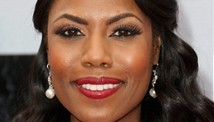 Omarosa O. Manigault
Omarosa O. Manigault Last year I rallied with other families, who like mine, had lost a loved one to gun violence. I joined the Rev. Al Sharpton, the Rev. Jesse Jackson and Trayvon Martin's family in Los Angeles. I connected instantly with Sabrina Fulton, Trayvon's mother, bonded by grief. I shared the story of my brother's murder during the rally to show the Martin family was not alone in their struggle or despair.
My brother Jack Thomas Manigault Jr. was shot and killed in cold blood on October 11, 2011. He was in his bed sleeping when a 22-year-old man forced his way into his home and killed him. What followed was a year-long bout with the judicial system. On April 24, 2012, on the eve of the murder trial, my family and I made the difficult decision to accept a plea deal from the defense. When faced with the daunting decision of whether to put my family and my brother's four sons through a very public trial, I opted not to.
My lawyer warned me because my brother was African American and his assailant white, the trial would be judged through a racial prism. My brother was not perfect, but Jack had been working to turn his life around. I was cautioned that my brother would have his character and past called into question and anything he had done as a young man could and would be used to justify his fate.
At times I questioned my decision to accept a plea deal. The judge assured my brother's killer, who pleaded guilty to aggravated murder and other charges, that a conviction at trial would have netted him a harsher sentence than one negotiated by prosecutors and defense attorneys. It was the risk that we as a family took to protect my brother from being characterized as just another black male fatality.
Sabrina Fulton stands for all of the mothers and families who have to face the painful reality that we may never find peace or justice in this judicial system for our loved ones. We should use this moment to examine the system that at times, like now, leaves many of us shocked and dismayed. I hope and pray that some day things will get better.
Omarosa O. Manigault is assistant pastor at Weller Street Missionary Baptist Church in Los Angeles and former reality TV star.
Rice: Trayvon was killed for being young, male and black
Black men and boys are conditioned to be invisible. Our visibility scares folk. It scares white people and many "respectable" black people, too. It scared George Zimmerman. And George Zimmerman killed Trayvon Martin because of his fear, and because of the cowardice at the core of his special type of being afraid.
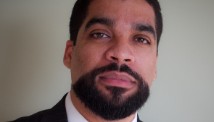 David Wall Rice
David Wall Rice Trayvon Martin was profiled on the night he was killed. There is little room for debate here. And on Saturday night, six jurors in Sanford, Florida indicated that it is all right to think a 17-year-old black boy is a threat just for being who he is. It is OK to shoot him through the heart, to end his life. It is legal to do it. It is justified, even if that black young man is an innocent, a child packing a beverage and a pack of candy. That mistake gets a pass.
Novelist Ralph Ellison explained so precisely, "They see only my surroundings, themselves, or figments of their imagination -- indeed, everything and anything except me." This is the every day reality of being a black man. We all know it, even if it's just deep down and covered up. Nonetheless, we go along with the disjointed dance of democracy and justice for all.
We know that black men and boys are understood to be a threat. Trayvon Martin and his family, and those who more squarely fit feared stereotypes, deserve justice. Fear of "them," of me, fear of my son, is a psycho-social distance bred from insecurity and has nothing to do with the "other."
"What are you without racism?" Toni Morrison asked Charlie Rose some years ago in an interview. We do well to follow her inquiries. "Are you any good? Are you still strong, still smart? Do you still like yourself?"
A knock-knock joke at the opening for the defense and the not-guilty verdict at the end show the level of respect that the Florida judicial system afforded Trayvon Martin's life. This is the racism that black boys and men consistently negotiate. Our lives, clearly, depend on negotiating it well. Those who argue counter are simply ignorant of the deeply embedded institutional and cultural racism here in the U.S.
Now comes the work that many of us are ready to undertake, or to recommit to. The work to be visible -- to step beyond the easy stereotypes that we play to and the ones that society affixes to us.
The work is beginning. Social media messages. Rallies on Sunday in New York City, Philadelphia, San Francisco, Los Angeles, Chicago, Washington, D.C., Atlanta and other cities across the country demonstrate the momentum of feeling against the terrible wrong of the Martin case, a wrong that threatens the liberties of us all.
-- David Rice is associate professor and chair of the Department of Psychology at Morehouse College.
LZ Granderson: Trayvon could have been my son
Hours before the George Zimmerman not-guilty verdict was announced, my partner and I were discussing ways to prevent our 16-year-old son from getting shot while jogging in the upper-middle-class, predominantly white neighborhood we had recently moved into.
 LZ Granderson
LZ Granderson I promise you, it was a very real conversation.
"Maybe we should get T-shirts and sweatshirts with the school's name on it," my partner said.
After the verdict -- it came as a punch to the stomach -- we thought maybe it was best if he only ran inside at the nearby gym.
This is what it means to be a parent of a young black man in America today: sleepless nights, courtesy of a cocktail of institutional racism, self-inflicted wounds and statistics.
Lots and lots of statistics.
About the too-high high school dropout rate among black youths, the distressingly high number of black men who are perpetrators -- and victims -- of violent crimes, the disproportionately steep incarceration rates for black men. Those who create our pop culture have learned to monetize that negative image, and some young black men are mesmerized by it, adopting it as their own. As a result, we are all susceptible to the same prejudicial thoughts that led George Zimmerman to view a 17-year-old boy with a hoodie on his head and a bag of candy in his hand as suspicious.
Read LZ's full commentary
Trayvon could have been my son -- and that scares the hell out of me. If, during this 16-month ordeal, that thought never crossed your mind, then you have no idea what it is like to be the parent of a young, black male in America. After the verdict, attorneys from both the prosecution and defense seemed to go out of their way in their press conferences to say race was not a factor, which sounded more like wishful thinking than accurate commentary.
-- LZ Granderson, who writes a weekly column for CNN.com, is a senior writer and columnist for ESPN the Magazine and ESPN.com.
Thernstrom: Obama's mistake on Trayvon Martin case
Every American can make his or her own judgment about whether justice was served by the verdict in the George Zimmerman murder trial but one thing we should all recognize: President Obama's interference in a local law enforcement matter was unprecedented and inappropriate, and he comes away from the case looking badly tarnished by his poor judgment.
 Abigail Thernstrom
Abigail Thernstrom "If I had a son, he'd look like Trayvon," the president said when asked about the case in the Rose Garden on March 23, 2012, after many had called for Zimmerman's arrest but several weeks before he was charged. "When I think about this boy, I think about my own kids."
In fact, if the president had a son, he would have been born to extraordinary privilege and raised with all the advantages of two very affluent and highly educated parents. He would have gone to tony private schools. His path in life would have been almost as dissimilar from Trayvon's as one could imagine.
Read Thernstom's full column
Yes, Obama's hypothetical son and Trayvon would have shared the same brown skin color. Would that have made them interchangeable? Not unless all brown-skinned boys are the same. Does the president really believe that?
The president's remarks created a clear impression that he was motivated by one of two factors, and we can only guess as to which, or what combination of the two, was at work here. One possibility is that this is merely another manifestation of the president's well-known narcissism.
The other, more troubling possibility is that the president surrendered to his political instincts.
On Sunday, the president did once again separate himself from the voices of anger. "We are a nation of laws and the jury has spoken," he said. But if his Justice Department brings civil rights charges against Zimmerman, the ugly racial politics of this prosecution will be undeniable.
Let us hope it never comes to that, for at that point a double tragedy will have occurred. Trayvon Martin will be dead, and our hopes for a president whose judgment is unaffected by his race will have been thoroughly and irreparably dashed.
-- Abigail Thernstrom is the vice chairwoman of the U.S. Commission on Civil Rights and an adjunct scholar at the American Enterprise Institute.
Brazile: Those who despair or delight in verdict are wrong
Like so many others, I am distraught. It will take many days to sort through my feelings and reactions to the verdict of not guilty in the Trayvon Martin case. Still, some thoughts and lessons are obvious, immediate and, in a sense, imperative.
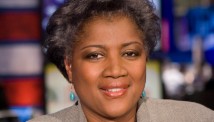 Donna Brazile
Donna Brazile First, those who delight in the verdict are wrong. There is no winner here. Trayvon Martin is still dead and George Zimmerman still must live with the fact that he killed without reason or cause. Here, the "should have" rules: He should have stayed in the truck.
Those who react to the verdict with despair are wrong. We work hard for justice in this world, but we, being human, are flawed. We will make mistakes. The law is only our best approximation of justice, and the law needs constant revision. But doing what's right is not limited to the law. Sometimes, we must go beyond it.
Read Donna Brazile's full column
Those who expect -- perhaps desire -- a riot are wrong. We are better than that. We respect the law. While the law cannot force a person to be moral or tolerant, through the law we can demand respect and expect equality.
We must be honest about our weaknesses. Racial profiling still exists and it is a cancer.
If you don't know about the "black male code," you should. It's something black boys learn early. It goes, in part, like this: Even though you're not a criminal, some people assume you are, especially if you're wearing certain clothes. Never argue with the police, but protect your dignity and take pride in humility.
Let us focus on ways to improve the system -- the criminal system, the justice system, the moral system, the general welfare system. Let us focus on acts of goodness and kindness that bring us together, as a people and as creations of God.
-- Donna Brazile, a CNN contributor and a Democratic strategist, is vice chairwoman for voter registration and participation at the Democratic National Committee.
Obeidallah: Our lack of racial empathy is appalling
The George Zimmerman trial has made one thing crystal clear. When racial issues arise, we tend to unquestionably cheer for our own race like it's a sporting match. There's little regard for the arguments or feelings of those from another race.
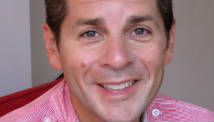 Dean Obeidallah
Dean Obeidallah Is the racial empathy gap in America growing? It seems so. At least judging by the chatter of comments surrounding the trial.
I heard repeatedly the statement from some Zimmerman supporters -- including a radio show host -- that "94% of black murder victims were killed by other blacks."
So instead of being empathetic to the Martin family -- whose son Trayvon was killed by Zimmerman -- the words discounted the killing by essentially saying that black people kill each other so much, why should we care about this one black kid?
On the other side, some people of color despicably threatened to harm or even kill Zimmerman after he was acquitted.
No matter what race you belong to, you have to admit this lack of concern for other races needs to be addressed.
Read Obeidallah's full column
Racial empathy means opening yourself to understanding why the other side believes what it does can help you find common ground.
Of course, this is not easy. It requires you to, at least temporarily, stop dismissing competing arguments. You don't have to agree with the opposing views, but you should listen and try to understand them.
Let's look at issues from the vantage point of another race: Why are they angry? Why are they afraid? What would you feel like if you lived in a community where the crime you see is committed almost exclusively by one race? Conversely, how would you feel if you were repeatedly profiled by the police and society simply because of your skin color?
If we don't get past the knee jerking defensiveness when discussing race, we will likely be burying more Trayvon Martins.
-- Dean Obeidallah, a former attorney, is a political comedian and frequent commentator on various TV networks including CNN.
Austin-Hillery: Echoes of "To Kill a Mockingbird"
In the iconic film, "To Kill a Mockingbird," Atticus Finch, a white lawyer defending a black man accused of attempting to rape a white woman in the deep South, is delivering his closing argument to an all-white-male jury: "In this country, our courts are the great levelers ... in our courts, all men are created equal," he says.
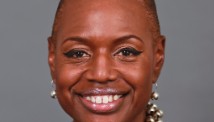 Nicole Austin-Hillery
Nicole Austin-Hillery Like the fictional defendant in the film, black America knows all too well that in this country, the promise of equal justice for all is often a hollow one. When black boys and men are killed by non-blacks, more often than not, justice will not be served.
Many black parents will try to explain to their children, especially their sons, what to make of the verdict, and they may be at a loss for words. How is it possible that a black child, walking where he had a right to walk, doing absolutely nothing wrong, could be pursued, confronted and ultimately shot dead by a neighborhood watch volunteer -- and the killer escape punishment?
Read Austin-Hillery's full column
White America cannot conceive of such a thing happening to its children, nor can it imagine that, were such a travesty to occur, the killer would escape punishment. But for black America, Trayvon Martin is the latest name on a long list of African-American men and boys whose non-black killers escaped justice in America's courts -- a list that runs from Emmett Till to Amadou Diallo to Oscar Grant to Sean Bell.
Often, the killers are never even charged and brought to trial, which is precisely the course that the Zimmerman case would have taken were it not for the protests of African-Americans and others across the country.
Black America's belief in the possibility of receiving justice from our legal system is eroded by every verdict that fails to hold a killer who is not black accountable for the death of a black man or boy.
My heart is heavy, not merely because Zimmerman was acquitted, but also because we as a nation have yet to make Atticus Finch's words ring true. Until we do -- until our courts are really "the great levelers" in which "all men are created equal," African-Americans killed by non-blacks will not find justice.
-- Nicole Austin-Hillery is the director and counsel of the Washington Office of the Brennan Center for Justice at New York University School of Law.
Gabriel: White or black, we see what we've experienced
In the courts and in society, we tend to think of racial bias as overt bigotry and imagine that the George Zimmermans and the Paula Deens of the world hold negative stereotypes of other races and intentionally think less of them as people.
 Richard Gabriel
Richard Gabriel Actual bias, however, operates in the brain in a much different way.
Despite our noble desire to love our fellow man, we are all suspicious of "The Other" -- in this case, the young man in a hoodie in the rain.
George Zimmerman has denied he holds any racial animosity. And that may be true. But with his statements, "F***ing punks. These a**holes, they always get away," he may have been unconsciously referring to a combination of race, youth, behavior, and clothing.
Trayvon Martin, in saying he was being followed by a "creepy-ass cracker," no doubt also racially labeled Zimmerman out of fear.
Read Gabriel's full column
There is a principle in social psychology called ingroup-outgroup bias, which is the tendency to judge members of your own group more favorably and others more harshly.
So when Juror B37 speaks to Anderson Cooper about not finding Trayvon Martin's friend Rachel Jeantel credible because she was "hard to understand" and "using phrases I had never heard before," it is obvious that it was hard for this juror to relate to this witness.
And it is a combination of skin color, idiom, nonverbal behavior, and personality that causes this cultural outgroup divide. This juror did not know about Rachel Jeantel's underbite, or that she grew up speaking Spanish and Creole.
Juror B37 spoke about Zimmerman's justified actions, his state of mind, her sympathies for him as well as the deceased Martin. In jury selection, she spoke about Sanford protests as "rioting." This juror could more easily relate to Zimmerman as the neighborhood watch volunteer trying to protect his neighborhood.
Nearly 20 years ago, when I was working for the defense on the O.J. Simpson case, much was made about the racial makeup of that jury -- made up of nine blacks, two whites and one Hispanic. But it was not just the skin color of those jurors that determined that verdict. Three-quarters of those jurors had personal experience with the police profiling, planting evidence, and engaging in other mistreatment.
We see what we have experienced. So we see what we want to see, whether we are a white juror in Sanford, Florida, or an African-American juror in Los Angeles.
It's time to stop pretending. It's time to make implicit bias explicit. If we're going to talk about race, let's talk about race without resorting to platitudes, righteousness or defensiveness. It's time to recognize that race is more than skin color. It is a rich tapestry woven with cultural, linguistic, behavioral and moral threads.
-- Richard Gabriel is the president of the American Society of Trial Consultants Foundation and president of Decision Analysis, a national trial consulting company. He has worked on the Casey Anthony and O.J. Simpson cases.
Follow us on Twitter @CNNOpinion.
Join us on Facebook/CNNOpinion.
Juror, Jeantel and bias
Posted by Unknown
CNN Exclusive: Juror B37 has more to reveal about the trial of George Zimmerman and how the not-guilty verdict was reached. Watch Anderson Cooper 360˚ on CNN Tuesday night at 8 ET.
(CNN) -- Editor's note: Richard Gabriel is the president of the American Society of Trial Consultants Foundation and president of Decision Analysis, a national trial consulting company. He has worked on the Casey Anthony and O.J. Simpson cases and is the author of the upcoming book, "Acquittal", to be published by Berkley Publishing, Penguin Group USA.
In the courts and in society, we tend to think of racial bias as overt bigotry and imagine that the George Zimmermans and the Paula Deens of the world hold negative stereotypes of other races and intentionally think less of them as people.
Actual bias, however, operates in the brain in a much different way.
Our acceptance of other people and cultures is a recent development in human history. The thousands of years of survival training we have acquired in our slow march up the Homo sapiens ladder have taught us to fear and suspect others who do not look and act like us. Wars and genocide have ravaged populations in such forms as the Crusades, Adolf Hitler, Pol Pot, the war in Bosnia, the Hutu-Tutsi conflict, and the recently highlighted battles between Shiites and Sunnis, all in the name of demographic differences.
 Richard Gabriel
Richard Gabriel Thomas Jefferson wrote the "all men are created equal" language in the Declaration of Independence while owning slaves. And despite the Emancipation Proclamation, the Supreme Court codified the oxymoronic "separate but equal" Jim Crow laws in the Plessy v. Ferguson case only 33 years later.
So, despite our noble desire to love our fellow man, we are all suspicious of "The Other" -- in this case, the young man in a hoodie in the rain. Whether that figure comes in the form of a black teenager, a gay co-worker, the Muslim neighbor, the overweight teacher, the barista with the tattoos and piercings, or, yes, even the gun owner, we all have biases. And yet most of us will never admit we have them, placing our own Gandhi-like bias-free self-image on a pillar of fairness and equity. But the truth is, the more we deny we have biases, the more we broaden and deepen those prejudices.
George Zimmerman has denied he holds any racial animosity. And that may be true. But with his statements, "F***ing punks. These a**holes, they always get away," he may have been unconsciously referring to a combination of race, youth, behavior, and clothing. His frustration with the high crime rate in Sanford, Florida, and the robberies in his neighborhood no doubt aggravated his need to "profile" the perpetrators he felt were victimizing his community.
Trayvon Martin, in saying he was being followed by a "creepy-ass cracker," no doubt also racially labeled Zimmerman out of fear. That is how all of our brains work. We categorize the characteristics of those who seem so different from ourselves that it makes us uneasy. And we do it without even thinking about it.
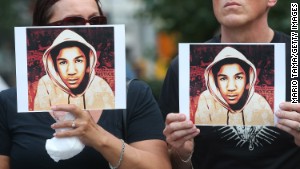 Taking to the streets post-verdict
Taking to the streets post-verdict 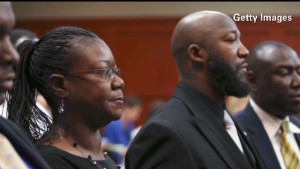 Martin's relatives respond to verdict
Martin's relatives respond to verdict 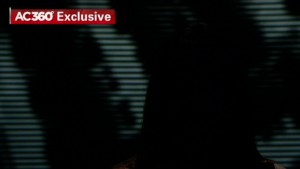 Juror: Zimmerman feared for his life
Juror: Zimmerman feared for his life 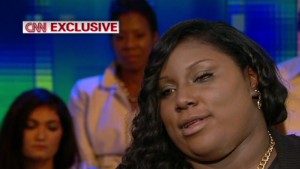 Jeantel: Verdict was disappointing
Jeantel: Verdict was disappointing There is a well-known principle in social psychology called ingroup-outgroup bias, which is the tendency to judge members of your own group more favorably and others more harshly. This has been followed by a great deal of recent research on "implicit bias" -- a subconscious negative association that we automatically attribute to others. Both of these cognitive blind spots are dangerous because they run in the background of our minds, all day long, outside our awareness.
So when Juror B37 speaks to Anderson Cooper about not finding Trayvon Martin's friend Rachel Jeantel credible because she found her "hard to understand" and Jeantel was "using phrases I had never heard before," it is obvious that it was hard for this juror to relate to this witness.
And it is a combination of skin color, idiom, nonverbal behavior, and personality that causes this cultural outgroup divide, not just her race. This juror did not know about Rachel Jeantel's underbite, or that she grew up speaking Spanish and Creole, or how those things affected her communication style, and thus could not relate to her.
In her interview, Juror B37 spoke about Zimmerman's justified actions, his state of mind, her sympathies for him as well as the deceased Martin. In jury selection, she spoke about the Sanford protests before the trial as "rioting." This juror could more easily relate to Zimmerman as the neighborhood watch volunteer trying to protect his neighborhood.
Jeantel, in her interview with Piers Morgan, said she believes that the situation was "racial" and Zimmerman was "finally gonna get one." Some of Martin's supporters invoked Emmett Till and Medgar Evers and criticized the racial makeup of the Zimmerman jury. Their comments, from their experiences, reveal the harsh reality of the world they live in.
Nearly 20 years ago, when I was working for the defense on the O.J. Simpson case, much was made about the racial makeup of that jury (made up of nine blacks, two whites and one Hispanic). But again, it was not just the skin color of those jurors alone that determined that verdict. Three-quarters of those jurors had personal experience with the police profiling, planting evidence, and engaging in other mistreatment. Their experience, derived from their racial reality, obviously made them more receptive to the defense's arguments about police misconduct. We see what we have experienced. So we see what we want to see, whether we are a white juror in Sanford, Florida, or an African-American juror in Los Angeles.
I have worked on more than a thousand trials and have watched jurors in hundreds of jury selections struggle to recognize their own biases and reconcile them with their desire to be impartial judges of facts and laws.
In jury selection in the Zimmerman case, jurors spoke about impressions they had already formed about the case, as well as their own experiences with crime and law enforcement. And while I do not question the Zimmerman jurors' fairness in deciding this case, fundamental psychology and common sense says that you are never fully able to "set aside" your experiences and the beliefs that you have held for years.
In much of this country, this pervasive ingroup-outgroup implicit bias has allowed minority defendants to be charged and sentenced at statistically disproportionate numbers while the disparity is dismissed with excuses, a shrug, and a resigned "What are you gonna do?" It has allowed institutional discrimination to occur in government, businesses, schools, and the courts, while politicians, executives, teachers, and judges vehemently deny its existence. And it has left a bitter legacy of disparate treatment of African-Americans by mostly white juries.
At the conclusion of this tragic case, we can divide again into camps of pro-Martin or pro-Zimmerman advocates and bemoan the lack of racial progress. However, instead of just shaking our heads and speaking sadly about how far we still have to go in the area of race relations, let's use this solemn opportunity to actually move the discussion forward. Just the fact that there has been so much peaceful reflection after this verdict shows a great deal of progress.
The American Bar Association, the National Center for State Courts, the Institute for the Advancement of the American Legal System, and the American Society of Trial Consultants Foundation have all recognized that these biases are a pernicious form of decay in our justice system, and these organizations are studying and implementing reforms in the courts.
A Tufts University study in 2006 showed that diverse juries made better decisions because the different perspectives made them more thorough and less likely to make factual errors. While I am not criticizing this jury's decision, the courts and local communities would all benefit from greater diversity.
Former Police Chief William Bratton significantly reduced inner city crime rates in New York and Los Angeles and improved police relations in minority neighborhoods by community policing policies that favored mediating differences instead of authoritarian strong-arm tactics.
Community courts are gaining favor as a way of building partnerships among residents, merchants, churches, and schools to address local safety and crime problems.
Bias is not simple, and we shouldn't pretend it is. We also should not act as though it is a horrible monster that we should run from. It isn't. It lives in all of us. We just don't know it. The real question for us is not whether we have biases, but how our biases affect how we see and interact with strangers, standing scared in the rain in the middle of a gated community.
So it's time to stop pretending. It's time to make implicit bias explicit. If we're going to talk about race, let's talk about race without resorting to platitudes, righteousness or defensiveness. It's time to recognize that race is more than skin color. It is a rich tapestry woven with cultural, linguistic, behavioral and moral threads.
It's time to talk without judging. It's time to listen without condemning. It's time to admit and take responsibility for who we are. Most importantly, it's time to start understanding. If we really want this trial to mean something, we owe both Trayvon Martin and George Zimmerman at least that much.
Follow @CNNOpinion on Twitter.
Join us at Facebook/CNNOpinion.
Abolition in the Land of Lincoln
Posted by Unknown
Editor's note: John D. Sutter is a columnist for CNN Opinion and head of CNN's Change the List project. Follow him on Twitter, Facebook or Google+. E-mail him at ctl@cnn.com.
(CNN) -- "Abolition" isn't a word you hear much in 2013. It should be, though. And a group of modern-day freedom fighters in Illinois is resurrecting the term -- with its echoes of 1800s America -- to combat ongoing slavery in a faraway West African country.
The Abolition Institute, which launched its website on Monday, is a newly formed group trying to end slavery in Mauritania, a remote outpost in the Sahara where an estimated 10% to 20% of people are enslaved, according to a U.N. expert.
"There's just a special connection between Illinois, where President Lincoln and President Grant and President Obama are from, and Mauritania," said Sean Tenner, the group's co-founder, who also hails from Illinois. "(They're) different places, but with the same path."
Hopefully that path leads to universal freedom.
I traveled to Mauritania in December 2011 to report on the issue for CNN's Freedom Project. It's an amazing and gut-wrenching place, full of vast potential but struggling to break slavery's psychological chains. More than a year later, I'm left with a deep sense of hope and cautious optimism that Mauritania will be able to break them.
 John D. Sutter
John D. Sutter Tenner and his nascent group are one reason for that. He saw the CNN report online in March 2012 and decided he wanted to do something to help abolish slavery in a country he'd never visited, in the name of people who he's mostly never met.
"To say it changed my life and changed other peoples' lives would be an understatement," he said.
The Abolition Institute has applied for 501(c)3 status as a nonprofit organization, Tenner said, but has not been granted that status yet. Its website lets users quickly petition the United States and other world governments to put pressure on Mauritania to prosecute slave owners "instead of protecting them." It calls slavery in Mauritania "one of the most pressing human rights issues of our time."
Tenner assembled a well-connected board of directors to raise awareness about the issue and to collect funds for anti-slavery groups who work on the ground in Mauritania.
The board includes veterans of Obama political campaigns, the Save Darfur movement, the Hotel Rwanda Rusesabagina Foundation -- as well as Mauritanian human rights activists who are now living in North America. Paul Rusesabagina, whose story inspired the film "Hotel Rwanda" and who is credited with rescuing 1,200 people during the 1994 genocide in that East African country, spoke at the Abolition Institute's grand opening.
Tenner, a 35-year-old from suburban Chicago, is following the path of many brave abolitionists in Mauritania -- several of whom I was lucky enough to meet.
Since our online project published last year, Biram Dah Abeid, head of one local abolitionist group, was arrested for burning Quornic texts he says condone slavery. Later, after being released, he was given the Front Line Award for Human Rights Defenders at Risk by a human rights group in Ireland.
Meanwhile, Boubacar Messaoud, head of a group called SOS Slaves and one of the long-standing heroes of the country's abolitionist movement, has provided assistance to women who recently escaped slavery or who come from the enslaved class. Tenner had a Chicago Cubs jersey made with Messaoud's name on it -- and wants to nominate him for a Nobel Peace Prize.
Tenner's first goal, though, is to make people aware that slavery exists in Mauritania, although government officials have denied its existence.
And he's smart to do so by forging ties between his state -- home to the American president who banned slavery and the country's first African-American president -- and a country in West Africa that continues to struggle for freedom.
"The more people around the world who are aware of the issue the more pressure will be generated on ... Mauritania," he said, "and the better the situation will become."
Follow @CNNOpinion on Twitter
Join us at Facebook/CNNOpinion
Race, bias and the Zimmerman jury
Posted by Unknown
CNN Exclusive: Juror B37 has more to reveal about the trial of George Zimmerman and how the not-guilty verdict was reached. Watch Anderson Cooper 360˚ on CNN Tuesday night at 8 ET.
(CNN) -- Editor's note: Richard Gabriel is the president of the American Society of Trial Consultants Foundation and president of Decision Analysis, a national trial consulting company. He has worked on the Casey Anthony and O.J. Simpson cases and is the author of the upcoming book, "Acquittal", to be published by Berkley Publishing, Penguin Group USA.
In the courts and in society, we tend to think of racial bias as overt bigotry and imagine that the George Zimmermans and the Paula Deens of the world hold negative stereotypes of other races and intentionally think less of them as people.
Actual bias, however, operates in the brain in a much different way.
Our acceptance of other people and cultures is a recent development in human history. The thousands of years of survival training we have acquired in our slow march up the Homo sapiens ladder have taught us to fear and suspect others who do not look and act like us. Wars and genocide have ravaged populations in such forms as the Crusades, Adolf Hitler, Pol Pot, the war in Bosnia, the Hutu-Tutsi conflict, and the recently highlighted battles between Shiites and Sunnis, all in the name of demographic differences.
 Richard Gabriel
Richard Gabriel Thomas Jefferson wrote the "all men are created equal" language in the Declaration of Independence while owning slaves. And despite the Emancipation Proclamation, the Supreme Court codified the oxymoronic "separate but equal" Jim Crow laws in the Plessy v. Ferguson case only 33 years later.
So, despite our noble desire to love our fellow man, we are all suspicious of "The Other" -- in this case, the young man in a hoodie in the rain. Whether that figure comes in the form of a black teenager, a gay co-worker, the Muslim neighbor, the overweight teacher, the barista with the tattoos and piercings, or, yes, even the gun owner, we all have biases. And yet most of us will never admit we have them, placing our own Gandhi-like bias-free self-image on a pillar of fairness and equity. But the truth is, the more we deny we have biases, the more we broaden and deepen those prejudices.
George Zimmerman has denied he holds any racial animosity. And that may be true. But with his statements, "F***ing punks. These a**holes, they always get away," he may have been unconsciously referring to a combination of race, youth, behavior, and clothing. His frustration with the high crime rate in Sanford, Florida, and the robberies in his neighborhood no doubt aggravated his need to "profile" the perpetrators he felt were victimizing his community.
Trayvon Martin, in saying he was being followed by a "creepy-ass cracker," no doubt also racially labeled Zimmerman out of fear. That is how all of our brains work. We categorize the characteristics of those who seem so different from ourselves that it makes us uneasy. And we do it without even thinking about it.
 Taking to the streets post-verdict
Taking to the streets post-verdict  Martin's relatives respond to verdict
Martin's relatives respond to verdict There is a well-known principle in social psychology called ingroup-outgroup bias, which is the tendency to judge members of your own group more favorably and others more harshly. This has been followed by a great deal of recent research on "implicit bias" -- a subconscious negative association that we automatically attribute to others. Both of these cognitive blind spots are dangerous because they run in the background of our minds, all day long, outside our awareness.
So when Juror B37 speaks to Anderson Cooper about not finding Trayvon Martin's friend Rachel Jeantel credible because she found her "hard to understand" and Jeantel was "using phrases I had never heard before," it is obvious that it was hard for this juror to relate to this witness.
And it is a combination of skin color, idiom, nonverbal behavior, and personality that causes this cultural outgroup divide, not just her race. This juror did not know about Rachel Jeantel's underbite, or that she grew up speaking Spanish and Creole, or how those things affected her communication style, and thus could not relate to her.
In her interview, Juror B37 spoke about Zimmerman's justified actions, his state of mind, her sympathies for him as well as the deceased Martin. In jury selection, she spoke about the Sanford protests before the trial as "rioting." This juror could more easily relate to Zimmerman as the neighborhood watch volunteer trying to protect his neighborhood.
Jeantel, in her interview with Piers Morgan, said she believes that the situation was "racial" and Zimmerman was "finally gonna get one." Some of Martin's supporters invoked Emmett Till and Medgar Evers and criticized the racial makeup of the Zimmerman jury. Their comments, from their experiences, reveal the harsh reality of the world they live in.
Nearly 20 years ago, when I was working for the defense on the O.J. Simpson case, much was made about the racial makeup of that jury (made up of nine blacks, two whites and one Hispanic). But again, it was not just the skin color of those jurors alone that determined that verdict. Three-quarters of those jurors had personal experience with the police profiling, planting evidence, and engaging in other mistreatment. Their experience, derived from their racial reality, obviously made them more receptive to the defense's arguments about police misconduct. We see what we have experienced. So we see what we want to see, whether we are a white juror in Sanford, Florida, or an African-American juror in Los Angeles.
I have worked on more than a thousand trials and have watched jurors in hundreds of jury selections struggle to recognize their own biases and reconcile them with their desire to be impartial judges of facts and laws.
In jury selection in the Zimmerman case, jurors spoke about impressions they had already formed about the case, as well as their own experiences with crime and law enforcement. And while I do not question the Zimmerman jurors' fairness in deciding this case, fundamental psychology and common sense says that you are never fully able to "set aside" your experiences and the beliefs that you have held for years.
In much of this country, this pervasive ingroup-outgroup implicit bias has allowed minority defendants to be charged and sentenced at statistically disproportionate numbers while the disparity is dismissed with excuses, a shrug, and a resigned "What are you gonna do?" It has allowed institutional discrimination to occur in government, businesses, schools, and the courts, while politicians, executives, teachers, and judges vehemently deny its existence. And it has left a bitter legacy of disparate treatment of African-Americans by mostly white juries.
At the conclusion of this tragic case, we can divide again into camps of pro-Martin or pro-Zimmerman advocates and bemoan the lack of racial progress. However, instead of just shaking our heads and speaking sadly about how far we still have to go in the area of race relations, let's use this solemn opportunity to actually move the discussion forward. Just the fact that there has been so much peaceful reflection after this verdict shows a great deal of progress.
The American Bar Association, the National Center for State Courts, the Institute for the Advancement of the American Legal System, and the American Society of Trial Consultants Foundation have all recognized that these biases are a pernicious form of decay in our justice system, and these organizations are studying and implementing reforms in the courts.
A Tufts University study in 2006 showed that diverse juries made better decisions because the different perspectives made them more thorough and less likely to make factual errors. While I am not criticizing this jury's decision, the courts and local communities would all benefit from greater diversity.
Former Police Chief William Bratton significantly reduced inner city crime rates in New York and Los Angeles and improved police relations in minority neighborhoods by community policing policies that favored mediating differences instead of authoritarian strong-arm tactics.
Community courts are gaining favor as a way of building partnerships among residents, merchants, churches, and schools to address local safety and crime problems.
Bias is not simple, and we shouldn't pretend it is. We also should not act as though it is a horrible monster that we should run from. It isn't. It lives in all of us. We just don't know it. The real question for us is not whether we have biases, but how our biases affect how we see and interact with strangers, standing scared in the rain in the middle of a gated community.
So it's time to stop pretending. It's time to make implicit bias explicit. If we're going to talk about race, let's talk about race without resorting to platitudes, righteousness or defensiveness. It's time to recognize that race is more than skin color. It is a rich tapestry woven with cultural, linguistic, behavioral and moral threads.
It's time to talk without judging. It's time to listen without condemning. It's time to admit and take responsibility for who we are. Most importantly, it's time to start understanding. If we really want this trial to mean something, we owe both Trayvon Martin and George Zimmerman at least that much.
Follow @CNNOpinion on Twitter.
Join us at Facebook/CNNOpinion.
Our lack of racial empathy is appalling
Posted by Unknown
Editor's note: Dean Obeidallah, a former attorney, is a political comedian and frequent commentator on various TV networks including CNN. He is the editor of the politics blog The Dean's Report. Follow him on Twitter @deanofcomedy.
(CNN) -- The George Zimmerman trial has made one thing crystal clear. When racial issues arise, we tend to unquestionably cheer for our own race like it's a sporting match. There's little regard for the arguments or feelings of those from another race.
Is the racial empathy gap in America growing? It seems so. At least judging by the chatter of comments surrounding the trial.
I heard repeatedly the statement from some Zimmerman supporters -- including a radio show host on Monday morning who is far from being a racist -- that "94% of black murder victims were killed by other blacks."
 Dean Obeidallah
Dean Obeidallah So instead of being empathetic to the Martin family -- whose son Trayvon was killed by Zimmerman -- the words discounted the killing by essentially saying that black people kill each other so much so why should we care about this one black kid?
It doesn't end there. There were speculations that there will be riots by the black community should Zimmerman be found not guilty.
As CNN's Don Lemon rightly pointed out Friday, these warnings basically label blacks as "barbarians" who "can't contain themselves."
On the other side, some people of color despicably threatened to harm or even kill Zimmerman after he was acquitted.
 Juror: George feared for his life
Juror: George feared for his life  Juror B37: 'It's very emotional' for me
Juror B37: 'It's very emotional' for me No matter what race you belong to, you have to admit this lack of concern for other races need to be addressed.
Sure, there were people protesting the Zimmerman verdict other than blacks, but overall they were few and in between. (Keep in mind that 75% of America's population is white.)
And when I say we lack racial empathy, I'm not talking about feeling sorry for a race because of their "plight." I mean true empathy -- "the ability to understand and share the feelings of another."
Racial empathy means being able to honestly contemplate what it would be like to be a member of a different race.
Psychologists have noted that this type of empathy fosters conflict resolution. Opening yourself to understanding why the other side believes what it does can help you find common ground.
Of course, this is not easy. It requires you to, at least temporarily, stop self-righteously dismissing competing arguments. You don't have to agree with the opposing views, but you should listen and try to understand them.
But when was the last time you heard leaders of community groups -- regardless of race -- say: "Let's look at from the other side?" I haven't.
A recent important study on racial empathy offers insights on the tangible consequences of our failure to identify with other races. Researchers found that participants believed that black people felt less physical pain when subjected to the same injury as white people because blacks "have faced more hardship."
In other words, the study shows that people are quicker to dismiss the suffering of blacks than of whites because black people have historically suffered more challenges like "higher rates of diseases, disability and premature death." The alarming conclusion is that this leads "to racial bias and potentially disastrous outcomes (e.g., condoning policy brutality against blacks, underestimating and undertreating black patients' pain)."
There's no simple fortune cookie piece of advice out there on how we can become more open and honest. But we can start simple.
How can we increase our racial sympathy? Let's look at issues from the vantage point of another race: Why are they angry? Why are they afraid? What would you feel like if you lived in a community where the crime you see is committed almost exclusively by one race? Conversely, how would you feel if you were repeatedly profiled by the police and society simply because of your skin color?
If we don't get past the knee jerking defensiveness when discussing race, we will likely be burying more Trayvon Martins. Let's try to stop the tragedies before they happen.
Follow us on Twitter @CNNOpinion.
Join us on Facebook/CNNOpinion.